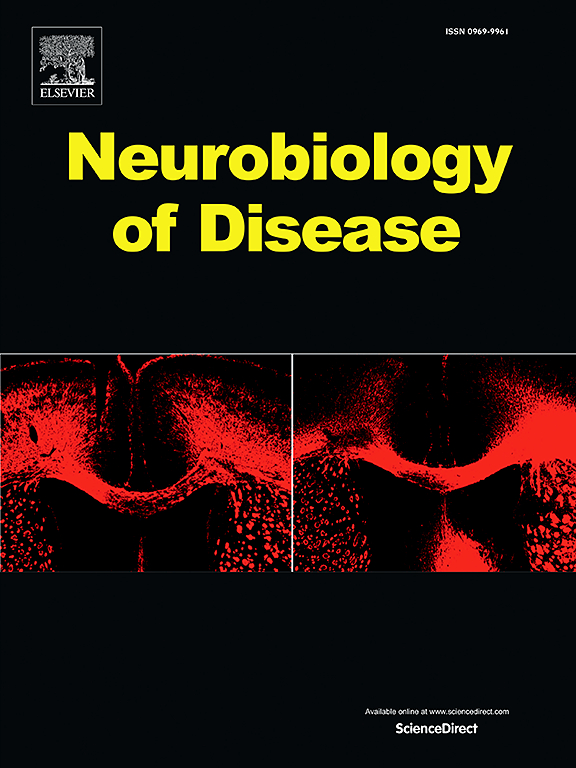APOE4 reshapes the lipid droplet proteome and modulates microglial inflammatory responses
IF 5.1
2区 医学
Q1 NEUROSCIENCES
引用次数: 0
Abstract
Excess lipid droplet (LD) accumulation is implicated in various diseases, including Alzheimer's disease (AD), yet the mechanisms underlying this accumulation remain unclear. Apolipoprotein E (ApoE) is a droplet-associated protein, and its E4 variant confers the greatest genetic risk for late-onset AD while also being linked to increased neuroinflammation and LD accumulation. In this study, we compared the lipid and protein composition of hepatic LDs in targeted replacement mice expressing human E3 (neutral) or E4 (risk variant), under both baseline conditions and following lipopolysaccharide (LPS) administration. Lipidomic analysis revealed that E4 LDs exhibit a shift in glycerophospholipid distribution, with an increase in phosphatidylcholine species, such that their baseline profile resembles that of LPS-treated LDs. Quantitative proteomics indicated that E4 LDs are enriched in proteins related to vesicle transport but show decreased levels of proteins involved in fatty acid β-oxidation. Notably, many LD-associated proteins overlapped with those identified in AD postmortem and microglial ‘omics studies, suggesting a role for LDs in AD pathogenesis. To further explore these findings, primary microglia from E3 and E4 mice were exposed to exogenous lipids, LPS, and necroptotic N2A cells. Under most conditions, E4 microglia accumulated more LDs and secreted higher levels of proinflammatory cytokines (TNF, IL-1β, IL-10) compared to E3 microglia, although their LPS response was blunted. These data suggest that altered LD dynamics in E4 microglia may contribute to the increased AD risk associated with APOE4.
APOE4重塑脂滴蛋白质组并调节小胶质细胞炎症反应。
过量脂滴(LD)积累与多种疾病有关,包括阿尔茨海默病(AD),但这种积累的机制尚不清楚。载脂蛋白E (ApoE)是一种液滴相关蛋白,其E4变异是迟发性AD的最大遗传风险,同时也与神经炎症和LD积累增加有关。在这项研究中,我们比较了在基线条件下和脂多糖(LPS)给药后,表达人类E3(中性)或E4(风险变异)的靶向替代小鼠肝脏ld的脂质和蛋白质组成。脂质组学分析显示,E4 ld表现出甘油磷脂分布的变化,磷脂酰胆碱种类的增加,因此它们的基线特征与lps处理的ld相似。定量蛋白质组学表明,E4 ld富含与囊泡运输相关的蛋白质,但与脂肪酸β-氧化相关的蛋白质水平降低。值得注意的是,许多ld相关蛋白与阿尔茨海默病死后和小胶质细胞组学研究中发现的蛋白重叠,这表明ld在阿尔茨海默病的发病机制中发挥了作用。为了进一步探索这些发现,我们将E3和E4小鼠的原代小胶质细胞暴露于外源性脂质、LPS和坏死的N2A细胞中。在大多数情况下,与E3小胶质细胞相比,E4小胶质细胞积累了更多的ld,分泌了更高水平的促炎细胞因子(TNF, IL-1β, IL-10),尽管它们的LPS反应减弱。这些数据表明,E4小胶质细胞LD动力学的改变可能与APOE4相关的AD风险增加有关。
本文章由计算机程序翻译,如有差异,请以英文原文为准。
求助全文
约1分钟内获得全文
求助全文
来源期刊

Neurobiology of Disease
医学-神经科学
CiteScore
11.20
自引率
3.30%
发文量
270
审稿时长
76 days
期刊介绍:
Neurobiology of Disease is a major international journal at the interface between basic and clinical neuroscience. The journal provides a forum for the publication of top quality research papers on: molecular and cellular definitions of disease mechanisms, the neural systems and underpinning behavioral disorders, the genetics of inherited neurological and psychiatric diseases, nervous system aging, and findings relevant to the development of new therapies.
 求助内容:
求助内容: 应助结果提醒方式:
应助结果提醒方式:


